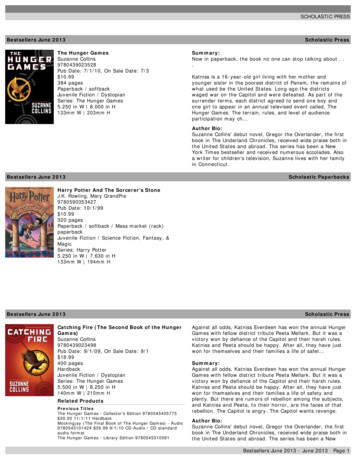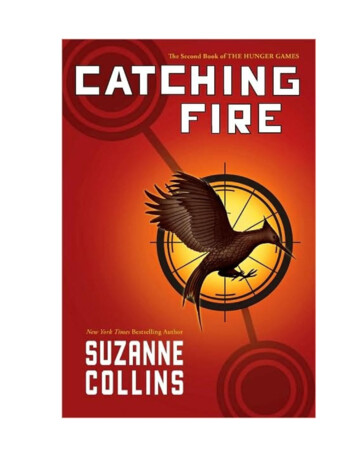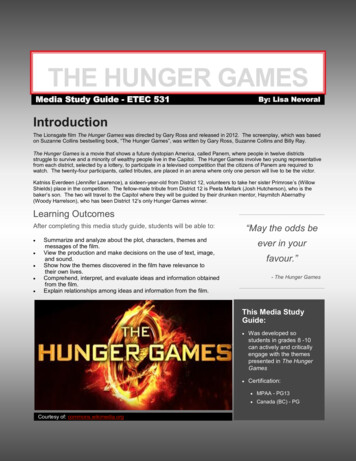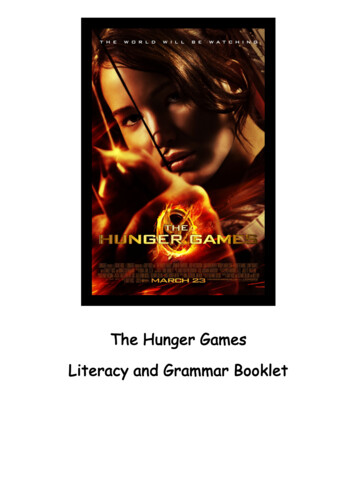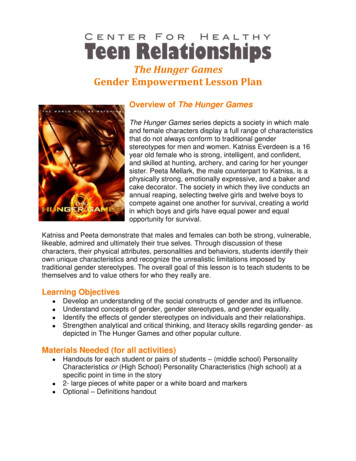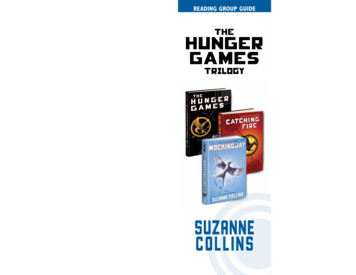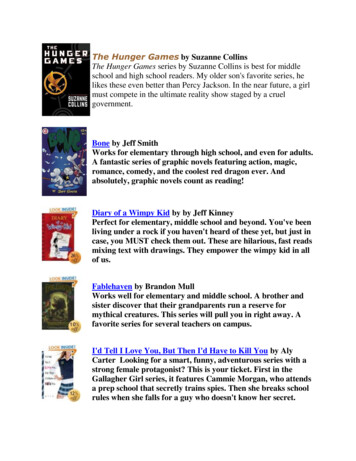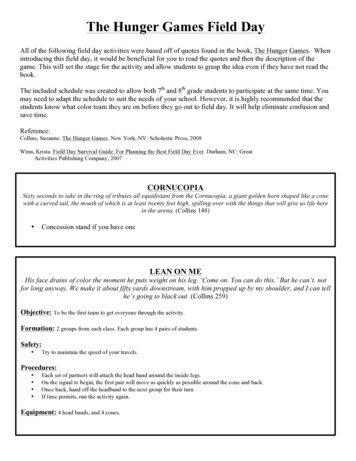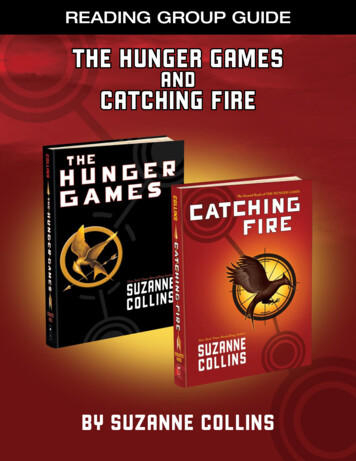
Transcription
reading group GuideThe Hunger GamesandCatching Fireby Suzanne Collins
About The Hunger GamesIn this gripping young adult novel set in a future with unsettling parallels to our present, the nation ofPanem consists of a shining Capitol surrounded by twelve outlying Districts, in the ruins of the area onceknown as North America. Sixteen-year-old Katniss and her friend Gale forage for food in the woodssurrounding their impoverished District, in this stratified society where the Capitol controls all resources.The main support for both their families, Katniss and Gale are apprehensive of the approaching annualReaping, when two “tributes” between the ages of twelve and eighteen will be chosen by lottery from eachof the twelve districts to compete in The Hunger Games, a survival contest on live TV in which teenagersfight to the death and there can be only one victor.When her beloved younger sister Prim is chosen as one of the tributes, Katniss volunteers to go inher sister’s place. Her fellow tribute from District 12 is Peeta, a boy with whom she soon develops acomplicated relationship. After traveling to the Capitol and undergoing elaborate training and preparation,Katniss and Peeta are launched into the game. In the terrifying events that follow, Katniss must marshal allher skills to stay alive and all her emotions to remain a caring human being in the face of the stark brutalityof the Games.“It’s hard to choose one element that inspired The Hunger Games,” says Suzanne Collins.“Probably the first seeds were planted when, as an eight-year-old with a mythology obsession, I readthe story of Theseus. The myth told how in punishment for past deeds, Athens periodically hadto send seven youths and seven maidens to Crete where they were thrown in the Labyrinth anddevoured by the monstrous Minotaur. Even as a third grader, I could appreciate the ruthlessness of thismessage. ‘Mess with us and we’ll do something worse than kill you. We’ll kill your children.’“Other early influences would have to include watching too many gladiator movies whichdramatized the Romans’ flair for turning executions into popular entertainment, my militaryspecialist dad who took us to battlefields for family vacations, and touring with a sword-fightingcompany in high school. But it wasn’t until the much more recent experience of channel surfingbetween reality TV programming and actual war coverage that the story for this series came to me.”Discussion Questions for The Hunger Games1. H ow does Katniss feel about the country of Panem?Why does she need to make her face “an indifferentmask” and be careful what she says in public?2. D escribe the relationships of Katniss with Gale, withPrim, with her mother. How do those relationshipsdefine her personality? Why does she say about Peeta,“I feel like I owe him something, and I hate owingpeople.” How does her early encounter with Peeta affecttheir relationship after they are chosen as tributes?3. H ow does the fact that the tributes are always on cameraaffect their behavior from the time they are chosen? Doesit make it easier or harder for them to accept their fate?How are the “career tributes” different from the others?4. W hy are the tributes given stylists and dressed soelaborately for the opening ceremony? Does thisceremony remind you of events in our world, eitherpast or present? Compare those ceremonies in real lifeto the one in the story.5. W hen Peeta declares his love for Katniss in theinterview, does he really mean it or did Haymitchcreate the “star-crossed lovers” story? What doesHaymitch mean when he says, “It’s all a big show.It’s all how you’re perceived.” Why do they need toimpress sponsors and what are those sponsors lookingfor when they are watching the Games?6. B efore the Games start, Peeta tells Katniss, “ I want todie as myself I don’t want them to change me in there.Turn me into some kind of monster that I’m not.” Whatdoes this tell you about Peeta? What does he fear morethan death? Is he able to stay true to himself during theGames?7. W hy does Katniss ignore Haymitch’s advice to headdirectly away from the Cornucopia? Did she do theright thing to fight for equipment? What are the mostimportant skills she has for staying alive—her knowledgeof nature?—her skill with bow and arrow?— her trapping ability? What qualities of her personality keep hergoing—her capacity for love?—her intelligence?—herself-control?8. W hy does Peeta join with the Career Tributes in thebeginning of the Games? What does he hope to gain?Why do they accept him when they start hunting as agroup? Why do groups form in the beginning when theyknow only one of them will be able to survive?9. W hat makes Katniss and Rue trust each other to becomepartners? What does Katniss gain from this friendshipbesides companionship? Is Katniss and Rue’s partnershipformed for different reasons than the other group’s?10. Discuss the ways in which the Gamemakers controlthe environment and “entertainment” value of theGames. How does it affect the tributes to know theyare being manipulated to make the Games more excitingfor the gamblers and viewers? Does knowing that sheis on live TV make Katniss behave differently than shewould otherwise?11. When does Katniss first realize that Peeta does carefor her and is trying to keep her alive? When does sherealize her own feelings for him? Did Haymitch thinkall along that he could keep them both alive by stressingthe love story? Are they actually in love?12. What do you think is the cruelest part of the HungerGames? What kind of people would devise thisspectacle for the entertainment of their populace?Can you see parallels between these Games and thesociety that condones them, and other related eventsand cultures in the history of the world?13. In 1848, Karl Marx wrote in The CommunistManifesto, “The history of all hitherto existing societyis the history of class struggles.” Discuss this statementas it applies to the society and government of Panem.Do you believe there is any chance to eradicate classstruggles in the future?14. Reality TV has been a part of the entertainmentworld since the early days of television (with showssuch as Candid Camera and the Miss America Pageant),but in the twenty-first century there has been atremendous growth of competitive shows and survivalshows. Discuss this phenomenon with respect to TheHunger Games. What other aspects of our popularculture do you see reflected in this story?
About Catching FireDiscussion Questions for Catching FireKatniss and Peeta have returned to their home District, but the return is hardly triumphant.Haunted by nightmares of the brutal deaths in the arena, Katniss is confused by her feelings forPeeta, while her relationship with her hunting partner and oldest friend, Gale, is changed in subtleways. Most challenging, though, is her relationship to the leaders in the Capitol. Her act of defiancein attempting a double suicide at the end of the Games forced them to allow both her and Peeta tolive, and there are intimations that Katniss has now become a symbol for rebellion in the Districts.The Victory Tour, designed to remind the people in the Districts of the power of the Capitol, maybe having quite a different effect this year.1. How did Katniss’s participation in the Games changeher relationship with Gale? Why does she say, “TheGames have spoiled even that .There’s no going back.”Then the president announces plans for the Quarter Quell, the seventy-fifth anniversary Games.Every twenty-five years the Capitol devises a new twist for the reaping, and this year they announcethat the tributes will be chosen from among the victors of previous Games. Thrown into the arenaonce more with Peeta, Katniss’s strategy must be different this year, but even Katniss doesn’t realizeall the implications of these Games and the outside forces that are gathering strength to potentiallyundermine the entire society.2. What emotions does Peeta stir in Katniss? Thoughshe is stiff and formal with him, what are her truefeelings? How did the events in the first Games affecttheir relationship?3. Why does President Snow come to Katniss’s home?What does he mean when he says, “ you haveprovided a spark which left unattended may grow intoan inferno .” What, exactly, was the significanceof the handful of poisonous berries at the end ofThe Hunger Games?4. How do the events of the Victory Tour affect Katnissand Peeta, their relationship to each other, and theirfeelings about their future?5. Why does the Capitol devise a special reapingprocedure for every twenty-fifth Game? Do you believethe requirements for this Quarter Quell were decidedin the past or were they designed for this Game to forceKatniss and Peeta back to the Arena?6. What is the significance of the mockingjay image?What does it mean to the people in the Districtsand the people in the Capitol? Why does Plutarch Heavensbee show Katniss the hidden mockingjayimage on his watch? Discuss how the mockingjayspecies developed and how Katniss happened to wear thepin during the first Games.7. Why does Gale refuse Katniss’s offer to try to escape intothe wild? What does he mean when he says, “It can’t beabout just saving us anymore”? How does Gale’s whipping change Katniss’s thinking about escape and herfeelings for Gale?8. What makes Katniss say, “No wonder I won theGames. No decent person ever does.” Is she being toohard on herself? What makes her realize that fighting theCapitol is more important than running away? What isthe importance of her meeting with Bonnieand Twill in the forest?9. Why does the Capitol push plans for the weddingof Katniss and Peeta if they know that they will bereturning to the Games in the Quarter Quell? What doesthe Capitol hope to gain by sending previousvictors back to the Games? Is it really, as Katniss says,a way to show “that hope was an illusion”?10. What do Katniss and Peeta learn when they watchthe video of Haymitch’s Hunger Games: the SecondQuarter Quell? How does it affect their understandingof Haymitch and the mockingjay symbol? How didHaymitch trick the Capitol?11. How do both Peeta and Katniss mock the Gamemakersduring the “talent show” portion of the training? Whydo they each take the chance of offending those whowill control the Games? How does this change theirfeelings for each other?12. Discuss the effect on Katniss of what happens to Dariusand Cinna. Why are the Capitol officials attackingthose who have befriended her? Why is Cinna attackedjust before Katniss is placed in the Arena?13. Why is Katniss determined to keep Peeta alive duringthe Games, even at the expense of her own life? Whendoes she realize the importance of forming allianceswith the other tributes? Why does Finnick save Peeta’slife? When does Katniss realize that her first impressionof Finnick was wrong?14. Describe the relationship between Katniss and Johanna.What made Katniss realize that Wiress and Beeteewould be helpful allies in the Arena? What importantcontribution does each one of the allies make to keepthe group alive? What is the role of the unseen “sponsors”?15. What is more harmful to the players in this Game—the physical traumas like the fog and rain of fire, or theemotional trauma of hearing the jabberjays?16. What does Haymitch mean when he tells Katniss beforethe Game begins, “You just remember who the enemyis—that’s all.” Who is the enemy? Have the othertributes been trying to keep Peeta or Katniss alive?Which of them is most important to the rebellion?17. Why were Katniss and Peeta not aware of the plans forthe rebellion? Why were they kept in the dark whenother tributes knew about it?18. What is the meaning of the title? How many differentways can you identify the theme of “catching fire” inthis volume?
Suggestions for Further ReadingComparing the BooksFictionNonfiction1. Discuss the differences between the Games in the first volume and the second—the training sessions, theinterviews, the set-up of the Arena, the strategies that Katniss and Peeta use. How is each of them changedby the time they spend in the Arena?Feed, by M. T. Anderson (Candlewick Press, 2004)In this futuristic society, a “feed” is embedded in thebrain of every person to keep up a steady stream ofinformation, entertainment, communication, andultimately, control. Survival in this world depends onhow well your individual “feed” is functioning and howwell you fit in with the popular culture.Black Potatoes, by Susan Campbell Bartoletti (HoughtonMifflin, 2005)Hunger and starvation during the potato famine of1845–1850 affected the lives of millions in Ireland,while the stratified society of Irish peasants and Englishoverlords contributed to the brutality of the situation.2. What are the forces that contribute to the rebellion in Catching Fire? Were they already starting to happen inThe Hunger Games? What clues about the rebellion can you find in the books?3. Why are all citizens of Panem required to watch The Hunger Games on television? How does this affect the people?Why haven’t they rebelled earlier against the brutality of the Games? Discuss the effect of television and reality TVin your own life.4. What are your predictions for the third volume in the series?5. Compare the society in Panem (the government, its tight control on the population, and the growing rebellion) toothers that you have studied or encountered in books or films. Consider historical and contemporary nations aswell as fictional worlds. What does Panem have in common with these cultures, and how does it differ? What canwe learn about our own world from studying and reading about historical and fictional societies?Connect to The ClassicsThe themes and setting of The Hunger Games and Catching Fire can be connected for teen readers to many piecesof classic literature that are required reading for high school students.Greek legend tells how King Minos of Crete demanded that seven Athenian boys and seven Athenian girls besacrificed in the labyrinth of the Minotaur until the hero Theseus volunteered to go in the place of one of theyouths and was able to slay the monster.In The Grapes of Wrath, set in the Dust Bowl years in the United States, extreme hunger leads ordinary people to seekextraordinary ways to stay alive during the Great Depression.The futuristic novels Brave New World, Nineteen-Eighty-Four, and Fahrenheit 451 all reflect the rigid control andstratified society of the populace that we see in The Hunger Games and Catching Fire.The Lord of the Flies explores how vicious young people can become, when forced to survive in a wilderness setting.“The Lottery,” a short story by Shirley Jackson, first published in The New Yorker in 1948, is a chilling tale ofritualistic murder committed as a fertility rite in small-town America (The Lottery and Other Stories, 2nd edition,by Shirley Jackson, Farrar, Straus, Giroux, 2005).GemX, by Nicki Singer (Holiday House, 2008)A future society is divided into the “Enhanced” and the“Natural Born,” both manipulated by a heartless ruler;but love reaches across the society’s barriers and bringshope to a few.Graceling, by Kristin Cashore (Harcourt, 2008)Lady Katsa, graced with the ability to win every fight,defies her tyrannical uncle, and through her own feelingsof compassion and her growing friendship with a foreignprince, finds her own way in the world.Harry Potter and the Goblet of Fire, by J. K. Rowling(Scholastic, 2000)In his fourth year at Hogwarts School, Harry’s nameis mysteriously chosen in a lottery to compete in theTriwizard Tournament that pits champions from severalschools against each other in a contest of magical skills,reasoning powers, wit, and endurance.Sunrise Over Fallujah, by Walter Dean Myers(Scholastic, 2008)The actual arena of a war zone in Iraq provides a settingin which present-day soldiers must be constantly alert tostay alive while making difficult decisions about who arepotential allies and who are their true enemies.Uglies, by Scott Westerfeld (Simon Pulse, 2005)A compulsory operation at the age of sixteen creates auniform standard of “beauty” in a futuristic society. Thestory continues in Pretties (2005), Specials (2006), andExtras (2007).Unwind, by Neal Shusterman (Simon & Schuster, 2007)Connor, Risa, and Lev are literally running for their livesin the future world where troubled teens may be chosenby a parent for “unwinding,” in which their body partsare harvested for use by other people.Deep Survival: Who Lives, Who Dies, and Why, byLaurence Gonzales (W. W. Norton & Company, 2004)An exploration of the biological and psychologicalreasons people risk their lives and why some are betterat it than others.The Night Olympic Team: Fighting to Keep Drugs Out ofthe Games, by Caroline Hatton (Boyds Mills Press, 2008)Behind the scenes at the 2002 Winter Olympics in SaltLake City, a team of scientists works through the night todiscover the use of performance enhancing drugs in theathletes.Rock, Paper, Scissors: Game Theory in Everyday Life, byLen Fisher (Basic Books, 2008)A Nobel-prize winner discusses the theory behind decisions people make in competitive situations and thestrategies that can change the outcome of their actions.Stop Teaching Our Kids to Kill: A Call to Action AgainstTV, Movie, and Video Game Violence, by Lt. Col. DaveGrossman (The Crown Publishing Group, 1999)This book presents an argument, based on research,against the influences that incite violent actions in youthtoday.The Worst Hard Time, by Timothy Egan (HoughtonMifflin, 2005)Egan relates a chilling chronicle of starvation andhardship during the Dust Bowl years of the 1930s inthe American Midwest, when economic issues andenvironmental disasters combined to change the livesof an entire population.
About the AuthorSuzanne Collins has had a successful and prolific careerwriting for children’s television. She has worked on thestaffs of several Nickelodeon shows, including theEmmy-nominated hit Clarissa Explains It All and TheMystery Files of Shelby Woo. She received a Writer’s Guildof America nomination in animation for co-writing thecritically acclaimed Christmas special, Santa, Baby!Suzanne Collins made her mark in children’s literaturewith the New York Times bestselling series the UnderlandChronicles, for middle grade readers. Her debut novel,Gregor the Overlander, received numerous accolades bothin the United States and abroad.Photo Credit: Cap PryorSuzanne Collins lives with her family in Connecticut.critical acclaim for the hunger games“I was so obsessed with this book.”—Stephenie Meyer, author of the Twilight Saga“I couldn’t stop reading addictive.” — Stephen King, Entertainment Weekly“Brilliantly plotted and perfectly paced.”—The New York TimesThe Hunger Gamesby Suzanne CollinsAges 12 & up, 0-439-02348-3, 17.99Catching Fireby Suzanne CollinsAges 12 & up, 0-439-02349-1, 17.99Both books are available from your local bookstore or usual supplier, or from:Scholastic, 2931 East McCarty Street, P.O. Box 7502, Jefferson City, MO 65102.www.scholastic.com/thehungergamesDiscussion Guide prepared by Connie Rockman, Youth Literature Consultant, adjunct professorof children’s and young adult literature, and Editor of the 8th, 9th, and 10th books in theH. W. Wilson Junior Authors and Illustrators series.SCHOLASTIC and associated logos are trademarks and/or registered trademarks of Scholastic Inc.
The hunger games and CaTChing Fire by suzanne Collins. abouT The hunger games In this gripping young adult novel set in a future with unsettling parallels to our present, the nation of Panem consists of a shin
